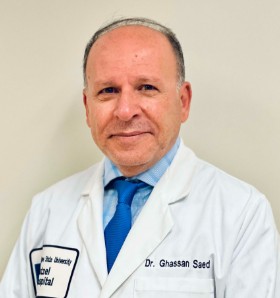| Faculty Profile |
|
Academic Rank
Associate Professor with Tenure
Phone
313-577-5433
Courses taught
PSL 5010 - Instructor and Advisor. Department of Physiology.
BIO 3990 - Instructor. Department of Biological Sciences.
BIO 6990 - Instructor and Advisor. Department of Biological Sciences.
IBS 7060: Biomedical Endocrine and Reproductive Systems Development - Instructor. Interdisciplinary Biomedical Sciences.
RSP 7350: Biomolecular Techniques: From Genes to Protein - Instructor. Department of Physiology with Concentration in the Reproductive Sciences Program (PhD).
PSL 7690: Cancers in Reproductive Organs; Cancers in Reproductive Organs/Journal Club - Instructor. Department of Physiology with Concentration in the Reproductive Sciences Program (PhD), Principles of Reproductive Biology.
PSL 7775: Molecular Mechanisms of Postoperative Adhesions - Instructor. Department of Physiology with Concentration in the Reproductive Sciences Program (PhD), Current Research Topics in the Reproductive Sciences.
PSL 7996: Arranged Research - Advisor/Mentor. Department of Physiology with Concentration in the Reproductive Sciences Program (PhD), Current Research Topics in the Reproductive Sciences.
PSL 9991, 9992, 9993, 9994: Thesis/Dissertation Research and Design - Advisor/Mentor. Department of Physiology with Concentration in the Reproductive Sciences Program (PhD), Doctoral Candidate Status I-IV.
PSL 9995: Candidate Maintenance Status - Advisor/Mentor. Department of Physiology with Concentration in the Reproductive Sciences Program (PhD), Doctoral Candidate Dissertation Research and Direction.
Director and Instructor. Department of Obstetrics and Gynecology, PCR Technique: Concept and Clinical Application Course (The C.S. Mott Center for Human Growth and Development).
Director and Instructor. Department of Obstetrics and Gynecology, Summer Reproductive Technology Course (The C.S. Mott Center for Human Growth and Development).
Director and Instructor. Department of Obstetrics and Gynecology, Laboratory Techniques Summer Course 2015 (The C.S. Mott Center for Human Growth and Development): Molecular Biological Procedures.
Publications
- Saed GM, Fletcher NM, Jiang ZL, Abu-Soud HM, Diamond MP.Dichloroacetate induces apoptosis of epithelial ovarian cancer cells through a mechanism involving modulation of oxidative stress. Reprod Sci. 2011 Dec;18(12):1253-61. Epub 2011 Jun 23.PMID:21701041
- Belotte J, Fletcher NM, Awonuga AO, Alexis M, Abu-Soud HM, Saed MG, Diamond MP, Saed GM.The role of oxidative stress in the development of cisplatin resistance in epithelial ovarian cancer.Reprod Sci. 2014 Apr;21(4):503-8. PMID:24077440
- Awonuga AO, Belotte J, Abuanzeh S, Fletcher NM, Diamond MP, Saed GM. Advances in the Pathogenesis of Adhesion Development: The Role of Oxidative Stress. Reprod Sci. 2014 Feb 11. PMID:24520085
- Fletcher NM, Saed MG, Abuanzeh S, Abu-Soud HM, Al-Hendy A, Diamond MP, Saed GM. Nicotinamide Adenine Dinucleotide Phosphate Oxidase Is Differentially Regulated in Normal Myometrium Versus Leiomyoma. Reprod Sci. 2014 Feb 11. PMID: 4520084
- Fletcher NM, Jiang Z, Ali-Fehmi R, Levin NK, Belotte J, Tainsky MA, Diamond MP, Abu-Soud HM,Saed GM.Myeloperoxidase and free iron levels: potential biomarkers for early detection and prognosis of ovarian cancer.Cancer Biomark. 2011-2012;10(6):267-75. PMID: 22820082
Research Description
Our research focuses on molecular mechanisms involved in the pathogenesis of tissue fibrosis, specifically postoperative adhesions. This involves the utilization of modern state of the art molecular biology and cell culture techniques as well as animal models. The major outcome of this work, in addition to the development of the ex-vivo model for adhesions, was the development and characterization of the adhesion phenotype in cell culture. Additionally, this cell culture system was used to test the hypothesis that hypoxia is the trigger for the development of postoperative adhesions. Parallel studies investigating the role of oxidative stress in the pathogenesis of ovarian cancer are also a major focus of our laboratory. The idea of studying ovarian cancer arose from the need to compare the effects of oxidative stress on the pathogenesis of a malignant overgrowth versus a benign overgrowth, such as postoperative adhesions. These studies resulted in the identification of biomarkers for progression and metastasis of ovarian cancer.
My lab is currently working on the development of biomarkers for early detection of ovarian cancer. Also identifying novel targets specific to ovarian cancer and develop molecules such as peptides to treat ovarian cancer.
My lab is currently working on the development of biomarkers for early detection of ovarian cancer. Also identifying novel targets specific to ovarian cancer and develop molecules such as peptides to treat ovarian cancer.
